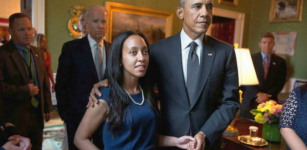Deaf and Blind Woman Graduates from Harvard Law School

She surfs, dances the salsa, has met two former US Presidents and is keen to try her hand at improvised comedy.
But that’s not all. In 2013, she was the first deaf-blind student to graduate from Harvard Law School and now works in advocacy as a lawyer specialising in disability rights.
So it’s possibly no surprise that Haben Girma made headlines globally when she was honoured by President Obama as part of the White House celebrations for the 25th Anniversary of the Americans with Disabilities Act.
Not only is it remarkable that Haben has achieved all these feats as a deaf-blind person, but she’s done it all before her 30th birthday.
Haben was born deaf-blind in Oakland, USA. She was educated through the public school system and learned Braille, adaptive technologies and how to travel independently. She attended an ordinary college in Portland and then went on to study at Harvard.
She can hear certain high-pitched frequencies, so if background noise is minimal – conversation is possible. Otherwise, she communicates by typing on a keyboard that’s connected to a digital braille device – a contraption she built for herself with a friend.
Signals in braille pulse into Haben’s fingers. Email, text, and other communications are similar: everything is connected to screen-reading software, which signals the braille. The clever device enables real-time conversation with anyone Haben meets.
Communication is key
And this is where her passion lies. Haben is on a mission to ensure that people with disabilities have equal access to information and opportunities which enable them to do anything they want. She is also keen to see advances in technology used to break down communication barriers.
Haben hopes to expand the public’s thinking, and to create positive and lasting change for people with disabilities.
“I want people to see the story of disability driving innovation, inspiring new technologies, bringing people together and connecting everyone – not just being ‘inspirational.’”
Her greatest desire is that it will not be considered an ‘extraordinary’ feat for a deaf-blind person to achieve their dreams, but something that is within the reach of everyone with a disability.
Haben says that, despite laws which guarantee access to education and ban discrimination, there is still a long way to go. She points out that people with disabilities represent the largest minority group in society, numbering one billion worldwide.







